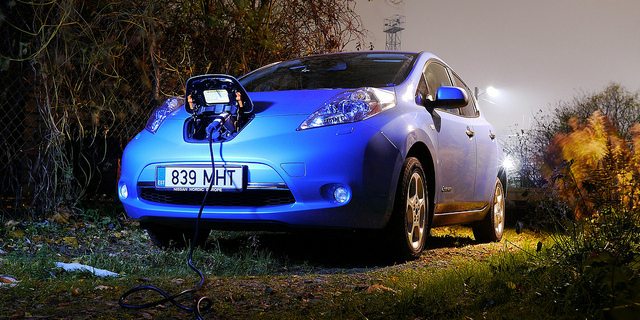 The other day I was piloting the after-activity transport shuttle and my 8-year-old, Leif, really, really had to pee. There wasn’t an easy pull-off and so I tried to explain that the irony of a boy named Leif peeing in the back seat of a car named Leaf would make the act of urinating in the back seat like crossing the streams in the movie Ghostbusters, which he has thus far been too frightened to watch and so maybe wasn’t the most effective analogy.
The other day I was piloting the after-activity transport shuttle and my 8-year-old, Leif, really, really had to pee. There wasn’t an easy pull-off and so I tried to explain that the irony of a boy named Leif peeing in the back seat of a car named Leaf would make the act of urinating in the back seat like crossing the streams in the movie Ghostbusters, which he has thus far been too frightened to watch and so maybe wasn’t the most effective analogy.
So I told him that if he pees in the backseat of an electric car, he will electrocute himself. We’ve been building with electricity lately, including 9v batteries that we lick to determine charge, and so he immediately understood the consequences. It worked. We made it home no problem. I even blocked the welcome-home attack of the labradors so the boy could make a beeline for the loo, but by that point he’d already peed in the yard so I guess the problem was solved.
The thing is, it was a bluff: I’m much too cheap and much too neurotic about my car’s battery life to waste electricity deep frying my son. I mean, how many joules would it take to electrocute a 54-pound 8-year-old? How many percentage points would this cost the battery of my beloved EV? How many of those damn Nissan Leaf animated dashboard trees would I forgo building? How much cost would be added to the monthly electric bill?
These are the difficult calculations we make as parents.
But the line of reasoning got me thinking about a more mundane but potentially even more useful question: how far would the money that I spend on electricity get me if I were spending the same amount on gas? Or, reframed, if I were paying for gas instead of electricity, how much would I be paying per gallon?
Here’s what I mean:
1. Our electric utility provider, Xcel Energy, charges at most $0.09 per kWh (tier II summer rate).
2. It takes about 24 kWh to charge the Leaf from 0 to 100 percent, meaning $2.16 for a full charge.
3. On this charge, with my driving habits and without spending electricity on little extras like air conditioning and corporal punishment, I get about 94 miles, meaning I pay about $0.022/mile for energy. (Just energy: influence of purchase price, repairs and depreciation not included in this post.)
4. Now compare this to our Subaru Forester, which, the way we drive, gets exactly 28.4 mpg.
5. This week we’re paying $3.39 for a gallon of gas at the King Soopers in Louisville, Colorado, meaning that it costs us $0.12/mile to power the Subaru.
6. Now we have a common unit between gas-powered and EV cars, namely the energy cost per mile! This is very exciting. And it means that my EV gets the cost equivalent of 155 miles per gallon (0.12/0.022*28.4). It also means that paying to charge my EV is the equivalent of paying $0.62 per gallon of gas. If you do the calculation with off-peak electricity rates or compare it to a car with lower gas mileage or a state with higher gas prices, the headline looks even rosier, pushing toward 300mpg and $0.30/gallon in equivalent energy costs.
Now, I like to think that I’m moderately concerned about the environment. And I like to think that I’m willing to gamble on an EV to provide a market that pushes the technology forward. But really I am a skinflint. I tailgate moving vans in the right lane of the highway to decrease wind resistance. I imagine the sound of a penny dropping into a piggy bank as my battery’s charge ticks upward a percentage point while coasting downhill. Sometimes I stop by the Nissan dealer to poach their monstrously fast charging station. And knowing my EV’s mpg makes it seem as if I can justify stopping for Thai food on the way home. Just, you know, as long as a child doesn’t have to pee.
***
If you want to share your stories of EV-related neuroticism, just generally want to engage with the EV community, or want a chance to win $250 that you can further lower your energy cost per gallon (or buy Thai food), check out the EV Selfie Contest run by The Electric Generation. Snap a selfie with your EV and post it to FB or Twitter, tagged #EVSelfie. That’s it. You’re entered. Sit back and watch the EV benefits accrue.



I am waiting for a 100% EV truck. When it comes, I will be first in line. I’m sold on the cost savings of EV, and I don’t do any long distance driving with my current gas-burning truck, so EV would be great. I’d even sacrifice 1/3 or so of the truck bed i that’s where they want to put the batteries, but it’s got to have a rear cab for two kiddos.
Not sure why an EV truck hasn’t been announced yet or even rumored, but here’s hoping.
Check out via motors. They have extended range trucks and vans (kind of like the Volt.) In fact the chairman of the board is Bob Lutz who headed up the Volt program at GM>
Calculate how much more an EV cost to purchase, add the cost of replacing the batteries just once, and I believe your numbers will be shockingly different.
You have neglected all the things that won’t have to be replaced. My leaf does not have catalytic converters, mufflers, a transmission, spark plugs, oil, etc. It is mechanically much simpler than a gas car. I have owned mine for over three years and the only things that I have had to replace so far are tires, wiper blades, and a cabin air filter.
The batteries do not have to be replaced, and the lease rates for EVs are comparable to similar gas cars thanks to incentives. The more you drive an EV, the more you save. A friend of mine saves $2,100 per year in his Leaf.
You either have very cheap electricity, or you’re not factoring in all costs. My bill says I pay 10.322 cents per KWh, but if I ad the total bill and divide it by KWh I get 11.554 cents and that’s lower than usual. My bill usually comes out just under 12 cents a KWh total after all taxes fees and such. Plus other areas of the country are much higher.
If you’re looking at it from an environmental view point then you should look at the pollution generated by your electricity supplier. In Ohio we have lots of coal so it’s pretty dirty. The way you relate is by saying what mpg of an equivalent vehicle pollutes. So for ohio it makes an EV equal to a vehicle that gets 32mpg. After getting a Volt I switched our generation to 100% wind power which makes the vehicle equal to one that runs at 5000mpg.